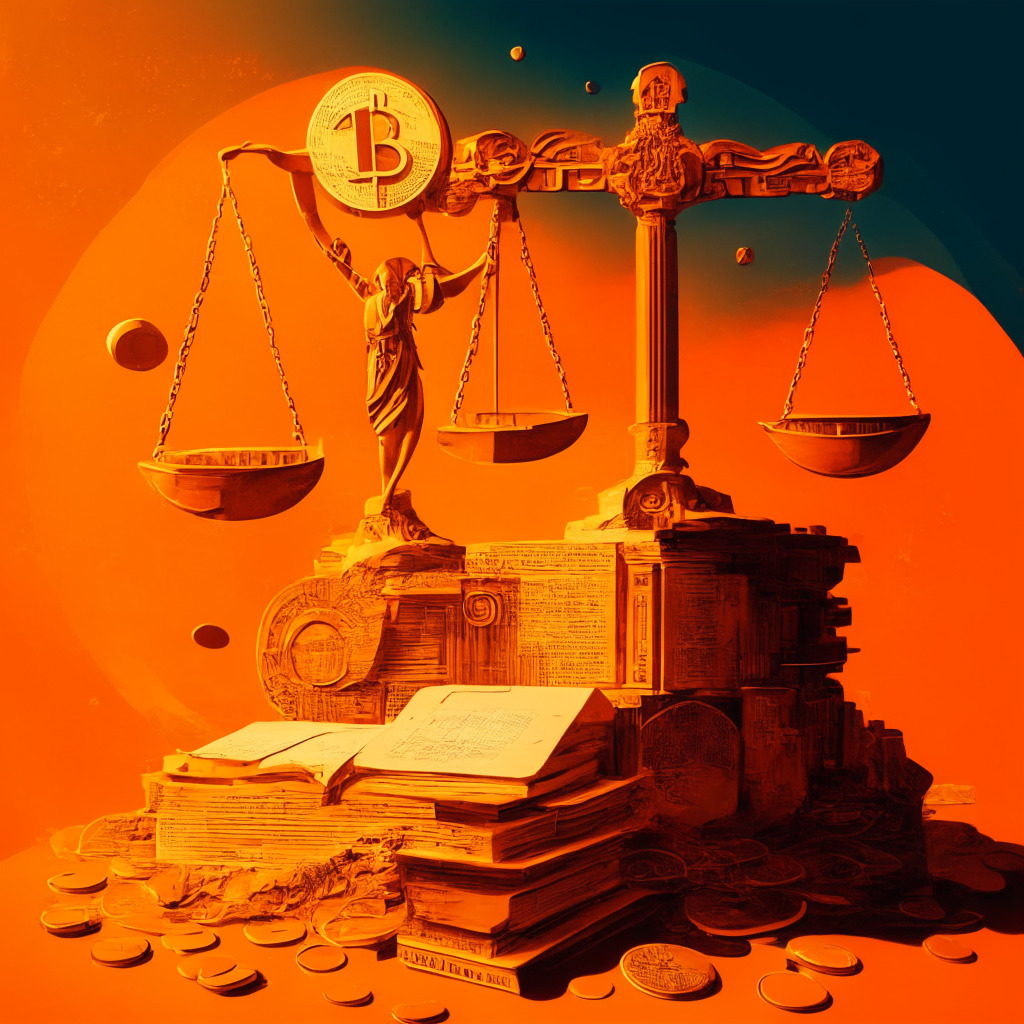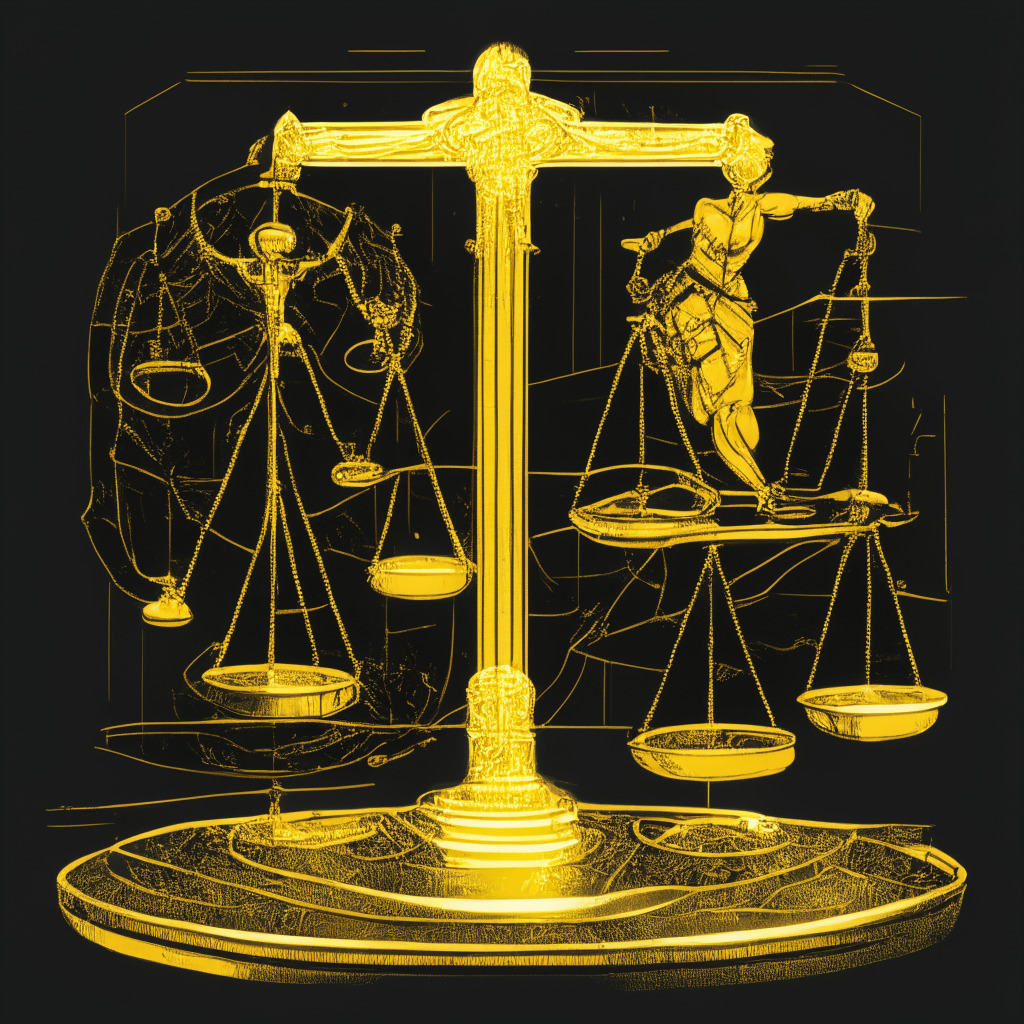A $200 Bitcoin transaction incurred a whopping fee of nearly $500,000, sparking a debate among crypto enthusiasts. Some hypothesize a money laundering plot, but others believe a faulty digital payment platform may be to blame. This incident highlights the pressing need for secure, efficient transaction processing to avoid such costly blunders in the future.
Search Results for: Orbit
Chinese Satellites and Blockchain: An Ornate Dance in Orbit and the Uncertain Fate of Cryptocurrencies Globally
“Chinese satellite, Tai’an Star Era 16, becomes the world’s first to carry a blockchain imaging and screening system into space. The ‘ADAChain’ system helps with multi-signature authentication, video visual broadcasting, and data storage certificate confirmation.”
Legal Tussle in Cryptoverse: Ex-FTX CEO Accused of Fraud, Conspiracy and Misconduct
A high-stakes legal case involving former FTX CEO, Sam “SBF” Bankman-Fried, brings attention to regulatory scrutiny in the crypto industry. Accused of fraud and financial misconduct, the case centers on allegations of Bankman-Fried’s favoring Alameda Research with certain exemptions, questioning the transparency, trust, and ethics of crypto platforms.
Unmasking Blockchain Security: Case Study Analysis of Stars Arena Exploit
“Securing blockchain platforms involves minimizing vulnerabilities and incorporating protections that render exploits economically unfeasible. As seen in Stars Arena’s recent incident, even if a flaw is exploited, high network costs can ironically make the loot extraction impractical for attackers.”
El Salvador’s Volcano Energy: Disrupting Crypto Mining with Renewable Power and Risking It All
El Salvador partners with Luxor Technology, with support from Tether, for its first renewable energy Bitcoin mining operation through Volcano Energy. This ambitious billion-dollar project aims to make El Salvador a powerhouse in renewable energy and Bitcoin mining. However, inherent challenges and critics question the appropriateness of using renewable energies for crypto mining.
Kazakhstan’s Crypto Crisis: A Plea to Survive Amidst Soaring Energy Costs
In an open letter to President Kassym-Jomart Tokayev, Kazakhstan-based digital asset miners, including eight major entities, urgently request a decrease in energy prices. They warn of industry-wide dessertion caused by untenable fees and increasing operational challenges, threatening an extinction of the country’s thriving mining ecosystem.
Cryptocurrency Regulation and Wealth Outflow: The South Korean Dilemma
Korbit’s research suggests the reported value of international digital assets declared to the South Korean National Tax Service may be exaggerated during regulation procedures. Many corporations could be retaining their crypto assets without means to distribute them wider, especially after the 2017 ICO boom.
Bitcoin’s Balancing Act: Excitement and Caution in the Face of Market Volatility and Ethereum ETFs
“Bitcoin saw a recent price knock at $28.5K, triggering doubt amongst market observers despite strong market interest. Some traders suggested possibility of ‘upside wick’ fakeout, or sudden price reversal. Meanwhile, upcoming Ethereum Strategy exchange-traded fund by VanEck looks promising, which could offer exposure to cash-settled ETH contracts, amidst cautious vigilance in crypto landscape.”
Unforeseen Fortune or Fraud? How a Payment Error led to a $6.7 Million Crypto Heist
A Melbourne couple face trial after being erroneously credited $6.7 million by Crypto.com and spending most of it. The mishap occurred when an intended $100 refund massively inflated to $10.5 million. This is not Crypto.com’s first sizable transaction error.
Dwindling Stablecoin Dominance: A Strategic Investor Shift or a Market Trend?
“Stablecoins have experienced a 17-month decline, losing market dominance by 11.6%, with a total sector drop of $124 billion. Despite this, stablecoin trading volume has grown by 10.9%. Some propose investors are cashing out stablecoins to diversify into traditional assets due to rising yields in fixed-income securities and cryptocurrencies. This pivot raises questions about the future behavior of the crypto market.”
The Baffling Surge in Ethereum Gas Fees: Binance’s Role and the Crypto Community’s Reactions
The Ethereum network recently experienced a drastic surge in gas prices due to 140,000 transactions directed towards a Binance wallet, leading to extensive costs for users. This resulted in the Ethereum network momentarily being the largest gas user and Binance losing around 530 ETH ($840,000) in gas fees.
Binance’s Ethereum Gas Spend Spree: A Technical Glitch or Evidence of Underlying Inefficiencies?
Binance reportedly spent an astonishing 530 Ether on gas fees in a day due to unexpected spikes in Ethereum network gas prices. This large expenditure, linked to the “Binance 14” wallet, provoked reactions and led to questions about the trading platform’s technology and coin management capabilities.
Bitcoin Network Welcomes Alpha: A Threat to Friend.tech or a New Bitcoin Era?
Alpha, a new decentralised social network protocol, is making its entry into the Bitcoin blockchain, enabling users to benefit from their digital profiles and content creation via social tokens. Unlike its rival, Friend.tech built on Ethereum, Alpha utilises Polygon blockchain for data preservation and Bitcoin for its scaling network, offering added scalability, security, and efficiency for launching decentralized applications. Amidst increasing interest, Alpha’s future looks promising, potentially transforming the rules in the blockchain universe.
Macro Winds Drive Traders to Niche Markets: Highs and Lows in the Crypto Landscape
“As Bitcoin and Ether face resistance, traders are exploring niche markets, notably new coins like XDOGE and EmotiCoin. Rising newcomer, MoonDAO token, is drawing attention too. Alternatives to these include crypto presales, offering great potential returns, though with high risks.”
Bitcoin Miner Returns Massive Accidental BTC Transaction Fee: Lessons in Community Ethics and Safety
A Bitcoin miner returned an overpaid transaction fee of $500,000 to Paxos. The fee, paid for a $2,000 transaction, was believed to be due to an error. Rather than distribute the windfall, the miner returned it, showcasing excellent integrity and contributing to the sense of mutual respect in the crypto community.
Regulatory Scrutiny vs Technological Advancements: Navigating the Complex Crypto Landscape
Despite regulatory challenges and hacking threats, the crypto sphere continues to innovate, with enhanced privacy, user experience, and transaction efficiency. As Ethereum plans a major transformation and Ripple maintains its legal standing, the tokenized assets market could reach $16 billion by 2030. However, effective regulation remains vital to safeguard all stakeholders.
Navigating the Crypto Market: XRP’s Resilience Amidst Decline and the Arrival of $WSM
Despite a slight 1.2% decline in value to $0.4787, XRP showcases resilience across the US trading session with a stable trading volume around $1 billion. However, the bearish predilection reflected in RSI and MACD leans towards further downswing. New market entrant, $WSM, initially bagged over $300,000, showing promising potential despite high inherent risks.
Blockchain’s Potential Role in AI Authentication and Its Legal Challenges in the US
“U.S. Rep. Tom Emmer suggests that blockchain technology could play a key role in authenticating AI-generated data, marking a significant intersection for blockchain and AI. Additionally, he signals potential policy distractions on digital assets, urging for innovative strides rather than legal controversies in cryptocurrency policies.”
Navigating Japan’s Crypto Future: A Tale of Opportunities, Challenges, and Innovation
“Kei Oda, former Goldman Sachs trader and current head of Quantstamp Asia-Pacific, discusses his journey into blockchain and crypto trading. Despite setbacks and high taxation, he recognizes the vibrancy of Japan’s crypto ecosystem, its appeal to startups, and potential for revolutionary uses like Ethereum. Furthermore, Oda expresses confidence in Japan’s balancing act in crypto regulation, inspiring interest even from its largest banking conglomerate.”
Navigating the Next Billion Users: Attracting Professional Traders to Crypto and Its Consequences
Professional traders are viewed as potential crypto users, influenced by high-frequency trading and dependent on cryptocurrency exchanges. These traders prioritize a platform’s functionality, device access, and a breadth of tradeable assets. However, their influx could inflate the crypto market, increasing the risk of a burst bubble and upping demands for regulatory scrutiny.
Venture Capitalism in the Crypto Sphere: Riding the Blockchain Wave Despite Market Downturns
Despite a recent decrease in venture investments, innovative crypto ventures are attracting capitalists. Projects like Orbital, unshETH, ZTX, Stroom Network, and Fxhash are gaining funding to develop blockchain payment infrastructure, liquid staking-related features, Web3 infrastructure, and an art creation platform, indicating that the blockchain scene continues to thrive.
Lawyers, Accountants, and Consultants: The Unforeseen Winners in Crypto Bankruptcy Cases
“In the volatile, uncertain world of cryptocurrency, it isn’t the mining companies or exchanges that are most profitable, but the lawyers, accountants, and consultants, whose wealth originates from the industry’s instability. Its high legal, accounting, and consultancy fees, reaching $700 million in 2022-23, result from complex, time-consuming bankruptcy cases.”
Ethereum Supreme Court: A Solution for DeFi’s Contract Disputes or a Threat to Small Protocols?
Matter Labs CEO, Alex Gluchowski proposes an “Ethereum Supreme Court” for dealing with recurring smart contract disputes in DeFi. His vision involves a blockchain-based court system, similar to real-world judiciaries, to provide resolution for contract-related disagreements, particularly focusing on enhancing measures to handle unforeseen vulnerabilities and emergencies in Layer 2 implementations.
Bitcoin ETFs: A Tug of War between Market Fluctuations, Regulatory Battles and Future Stability
Despite an 11% drop in August Bitcoin’s price, the market remained relatively stable due to the possibilities of a Bitcoin ETF. This was spurred by Grayscale’s legal victory against SEC’s planned obstruction of its Bitcoin Trust conversion to an ETF. However, SEC’s delay in approving other ETF applications signals authorities’ hesitancy to fully embrace cryptocurrencies. Regardless of regulatory uncertainties and market oscillations, optimism for cryptocurrency technology’s future remains.
Decoding RECs: Jacobi’s Green Solution to Bitcoin’s Energy Issues and the Regulatory Hurdles
Jacobi Asset Management’s new initiative involves decarbonization achieved through investments in Renewable Energy Certificates (RECs). Through this, Jacobi aims to account for Bitcoin’s carbon footprint in their ETF. However, despite success in Europe, stricter regulation in the US provides notable hurdles for such climate-friendly investments.
Sailing into Uncharted NFT Waters: FirstMate’s Vision of Creator-Owned Marketplaces
“FirstMate, a budding blockchain startup, has received $3.75 million in funding for the development of an ‘NFT storefront builder’ platform. Aimed at rectifying the existing focus discrepancy on NFT platforms, it promises to enhance creators’ experience by allowing them to exhibit collections, dictate royalty conditions, and create a marketplace that truly reflects their artwork’s quality.”
Swinging Scales of Justice: The Battle Over Expert Witnesses in the FTX Trial
The DOJ contests the validity of the witnesses proposed by FTX founder Sam Bankman-Fried for their trial, stating the insufficiency of their disclosures and potential confusion their testimonies might cause. Simultaneously, Bankman-Fried’s defense aims to dismiss DOJ’s financial analysis expert, causing a tug of war. This controversy emphasizes the line between enlightening and misleading expert testimonies in court.
Blockchain at the Helm: Thailand’s Prime Minister and His Bold Crypto Policies
Former Sansiri CEO, now Thai Prime Minister, Srettha Thavisin, known for his contributions to the digital asset industry, plans to introduce a national token scheme. Despite facing criticism over cost and feasibility, Thavisin’s crypto-supportive stance signals a potential shift in crypto regulations and development within Thailand.
Digital Tussles: Examining the Role of Facebook in Thailand’s Crypto Scams
Thailand authorities have warned Facebook, threatening to restrict its operations due to the rampant investment and cryptocurrency scam ads on the platform. The Thai Ministry of Digital Economy and Society states that Facebook’s laxity led to an alarming number of fraudulent ads, with an estimated damage reaching over 10,000 million baht.
Anatomy of a Crypto Clash: Gemini’s Battle with The SEC Over Unregistered Securities
“The SEC alleges Gemini’s Earn lending program and MDALA constituted unregistered securities sold to investors, sparking a legal battle that underscores crypto asset regulatory stalemate. This tussle further highlights emerging legal and financial ambiguities looming over the evolving crypto sector.”
Dissecting the Buzz Around Friend.tech: A New High in Crypto or Regulatory Overstep?
Friend.tech, a social tokenization protocol, shows promising revenue generation within the crypto sphere. With Friend.tech, personalities can issue shares for exclusive group chats, amassing around $709,000 in ether revenue in a day. Besides its appealing growth, the platform raises questions regarding over-economic focus and regulatory oversight.
The Global Disparity in Bitcoin Mining Costs: An Eye-Opener or Misleading Data?
“The disparities in Bitcoin production cost globally are due to varying electricity costs. Mining a single Bitcoin in Italy could cost $208,500, whereas in Lebanon it’s 783 times cheaper. However, only 65 countries are profitable for solo Bitcoin miners considering domestic electricity rates.”































